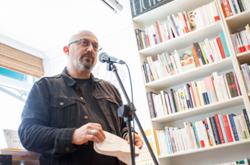After a triple stabbing at a Vancouver neighbourhood festival, questions immediately arose about how B.C.’s forensic psychiatric system had failed to protect the public from a man who had repeatedly committed violent acts during episodes of severe mental illness.
Blair Evan Donnelly, 64, has been charged with three counts of aggravated assault after allegedly stabbing three strangers at the close of the Light Up Chinatown festival on Sept. 10.
In 2008, Donnelly was found not criminally responsible of murdering his 16-year-old daughter Stephanie Donnelly in Kitimat in 2006. A judge found that Donnelly had committed the brutal stabbing because he believed God was telling him to kill his wife and daughters.
In 2009, Donnelly stabbed a friend while on day leave from B.C.’s Forensic Psychiatric Hospital in Coquitlam (also known as Colony Farm). In 2017, he attacked another patient with a butter knife.
In his annual assessment by a review board in April, the board was told Donnelly continued to pose a high risk to the public because of some unusual features of his bipolar disorder. Donnelly is unable to recognize when his mental state is deteriorating, and he shows few outward signs that he has entered an episode of psychosis.
The lack of warning signs was called “a unique feature of his illness” by one doctor who was familiar with his treatment.
Despite those warnings, review board documents show that Donnelly was approved for unescorted access to the wider community after that April review.
On Sept. 10, he allegedly again acted suddenly and violently: he is accused of stabbing a couple in their 60s and a woman in her 20s without warning or apparent reason at the close of the festival in Chinatown.
Donnelly was swiftly apprehended by police, who found him just a few blocks away and arrested him without resistance. The victims were seriously injured but will recover, according to police, and the event organizers have started a fundraiser for the three victims.
B.C. Premier David Eby has ordered an investigation into how that decision was made, which will be headed by former Abbotsford police chief Bob Rich. Eby said one of his most pressing questions is whether other patients with a similar risk level to Donnelly may also have been released unescorted into the community.
What happens after a person is found not criminally responsible?
The Tyee interviewed a forensic psychiatrist and examined the documents related to Donnelly to get a better understanding of this case, and how the criminal justice and health-care systems interact when people are found to be not criminally responsible for violent crimes.
The Criminal Code says people are found not criminally responsible if they committed a crime “while suffering from a mental disorder that rendered the person incapable of appreciating the nature and quality of the act… or of knowing that it was wrong.”
Dr. Sandy Simpson is a professor of forensic psychiatry at the University of Toronto. He said there’s a common perception that people found not criminally responsible for a crime “get away scot-free,” but that’s not true.
“You're not criminally responsible for what you did, but you are accountable for your understanding of your own self-management and keeping yourself safe long term,” he said.
“So it shifts from culpability argument, which is what the criminal justice system does, to an accountability argument. If your illness — the way it presents — continues to present a risk to others, you are subject to appropriate orders to ensure that you adhere to treatment, that you learn to understand your illness.”
For serious crimes, the courts generally order offenders confined in a forensic psychiatric facility.
Their case history and treatment progress are reviewed every year by a review board. Over 30 people are listed as being members of the British Columbia Review Board, but Donnelly’s April hearing was heard by Ingrid Friesen, a lawyer; Andrew Kolchak, a psychiatrist; and Doug LePard, a former police chief.
The review board can order the person remain under the care of a forensic psychiatric hospital. The board can impose conditions such as not possessing weapons, and can approve short-term community visits while the person continues to be under the care of a forensic psychiatric facility.
About 190 people are currently being held at the B.C. Forensic Psychiatric Hospital.
Simpson spoke to The Tyee about forensic psychiatry in general, and could not comment on Donnelly’s specific case. He said that sometimes people are approved to live in the community even after they have been deemed to be a significant threat. In those cases, they remain under the oversight of the review board and forensic psychiatrists.
“That's sometimes hard for the public to understand: how can a forensic patient be living in the community or on leave from the hospital, when the board has deemed the person to be a significant threat,” Simpson said.
“And that’s because the threat changes dynamically over time, and the process of rehabilitation is one of the person taking increasing responsibility for their own well-being, cognizant to risk in a series of steps.”
Rapid deterioration and few outward signs of psychosis
British Columbia Review Board documents obtained by CHEK News show that Donnelly’s doctors had concerns about his inability to recognize the signs when his mental condition started to deteriorate.
“Mr. Donnelly told the board he has a warning sign assessment tool that he uses twice daily to assess his mood and note any warning signs,” according to the review board’s reasons for disposition document from April. “He gave an example of excessive time spent on religious preoccupation that would trigger a warning to talk to staff.”
But despite having learned to use the assessment tool, “Mr. Donnelly acknowledged that when he is ill, he is unable to assess his mental state.”
There was also a concern that Donnelly did not understand the level of risk he continues to pose to the community: he complained that his reintegration was taking too long, and asked to be moved to Manchester House, a low-security transition home in Victoria operated by the John Howard Society of Victoria.
Psychosis is a state where a person is suffering hallucinations or delusions, often combined with intense fearfulness. Simpson explained it can be a symptom of drug intoxication or withdrawal, a “group of illnesses that are called schizophrenia,” and the manic or depressive phases of mood disorders like bipolar disorder or severe depression.
People in psychosis can have trouble judging time and space, be confused, feel threatened by individuals or their surroundings and hear voices urging them to do or say certain things.
People acting violently while in acute psychosis is rare, but it does happen, Simpson said.
“If the person receives treatment in a timely manner, that can prevent bad things occurring,” Simpson said. “It can occur in anybody, and in many of these tragic cases, it’s a person who acts in a way that they never would normally.”
People acting violently while in psychosis are also at risk of being killed or injured by police, often because they are not able to follow commands to stop moving or drop a weapon.
What’s unusual about Donnelly’s psychotic episodes is that there has been little or no warning he’s in a psychotic state and having delusional thoughts.
Donnelly was first diagnosed with bipolar disorder after a manic episode in 1995, when he developed a religious delusion that he was meant to father a child with another man’s wife. After diagnosis, he was able to resume work and life “without further difficulties” in the northern B.C. town of Kitimat, where he worked in the resource industry.
Nearly 10 years later, on Nov. 23, 2006, Donnelly’s wife thought he was acting oddly, but later felt like she had overreacted when she asked their pastor to come by to speak with her husband.
But over the course of that day, Donnelly was inwardly interpreting everyday events — his neighbour choking on tea, a dog playing with a toy — as signs from God that he needed to kill his wife and daughters.
According to review board documents, “one of the most striking features of [the murder] is that Mr. Donnelly did not exhibit any signs of mental deterioration before the attack on his daughter.”
In testimony to the review board, Dr. Mandeep Saini described the lack of “significant warning signs” before violent episodes as “a unique feature of his illness.” Saini also noted there have been long periods of remission between the violent episodes, but despite apparent progress, Donnelly’s violent psychotic episodes have continued to return with little warning.
Treatment plan not followed
The review board was also told about a concerning breakdown in safety protocols in 2022. Because Donnelly had been making good progress, he was living at a lower-security forensic facility called transitional cottages run by non-profit Coast Mental Health on the grounds of the former Riverview Hospital. Staff at the cottages noticed Donnelly had started acting “abrupt and aggressive” and sent an email to Forensic Psychiatric Hospital, which one of his doctors, Dr. Leeanne Meldrum, saw and responded to.
Donnelly was sent back to the Forensic Psychiatric Hospital, but when Meldrum spoke to staff at the cottages she was alarmed to learn that he had been living in one of the units unsupervised for three days. That was not the treatment plan for him.
“Dr. Saini testified that both he and Dr. Meldrum concluded that CTC had failed to supervise the accused at the high level required by the treatment plan,” review board documents state. There was also discussion about post-COVID staffing problems that had left the transitional cottages understaffed during the time Donnelly was placed there.
“Dr. Saini testified that the decision to place the accused in an unstaffed cottage was not approved by either the hospital team or the community forensic team. In addition, communications about Mr. Donnelly’s mental health had not been communicated in a timely manner.”
On April 24, the British Columbia Review Board ruled that Donnelly would remain under the care of Forensic Psychiatric Hospital in Coquitlam for at least the next eight months, and a under a number of conditions, including prohibitions on consuming alcohol, cannabis or illicit drugs and possessing any weapons.
He was also allowed “escorted and unescorted access to the community dependent on his mental condition” and at “the director’s discretion.”
There is no explanation in the documents The Tyee has access to that shed light on why or how this access was to be granted.
According to Vancouver police, Donnelly was out on a day pass from Forensic Psychiatric Hospital when he allegedly stabbed three people on Sept. 10. ![]()
Read more: Health, Rights + Justice

















Tyee Commenting Guidelines
Comments that violate guidelines risk being deleted, and violations may result in a temporary or permanent user ban. Maintain the spirit of good conversation to stay in the discussion and be patient with moderators. Comments are reviewed regularly but not in real time.
Do:
Do not: